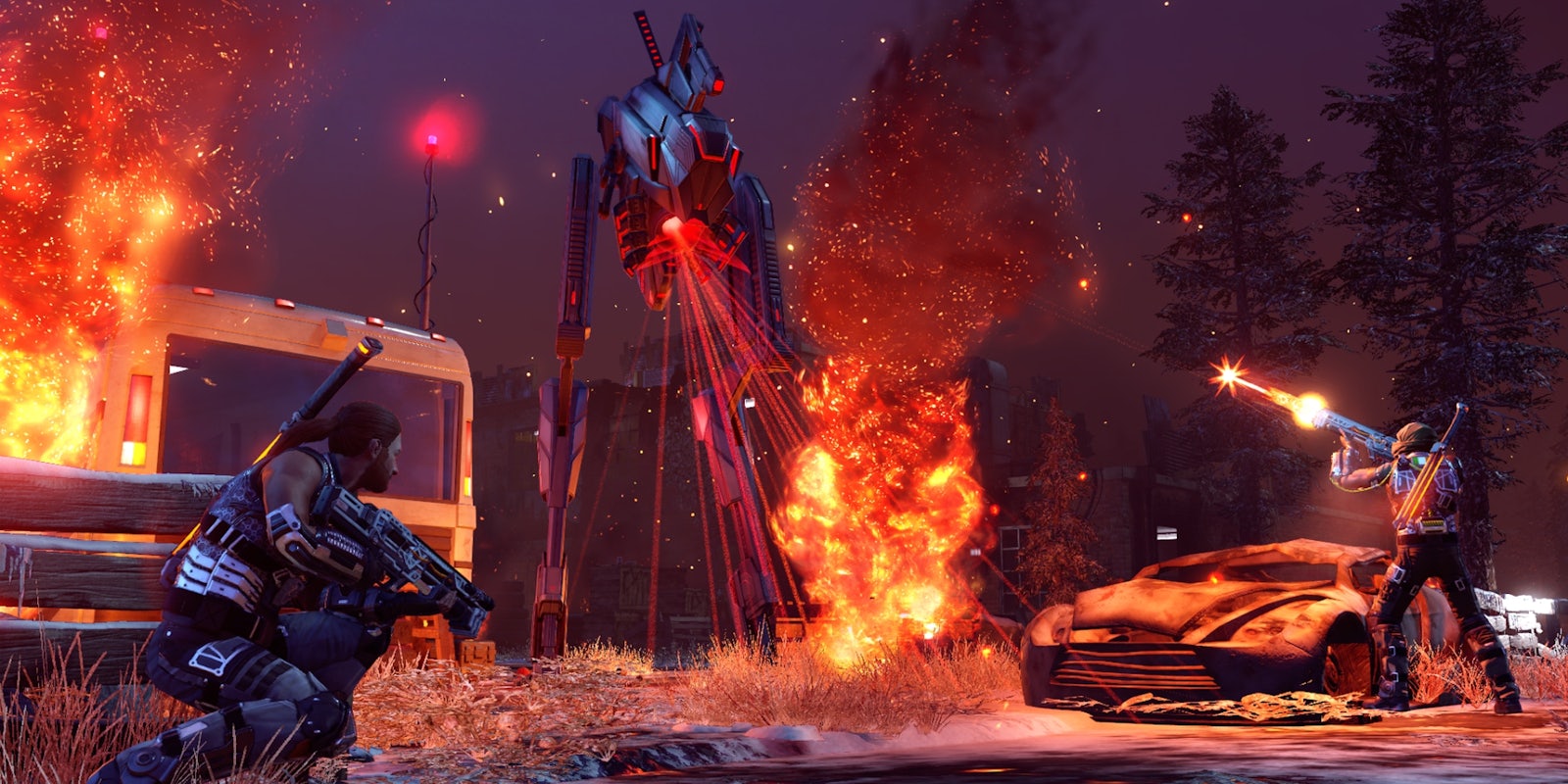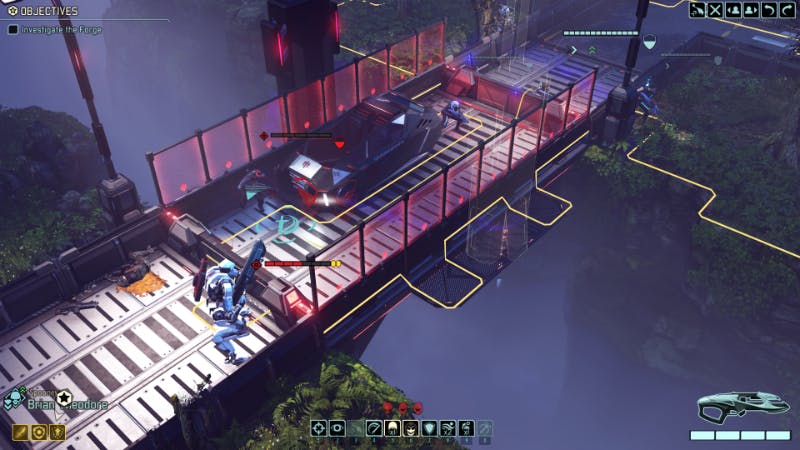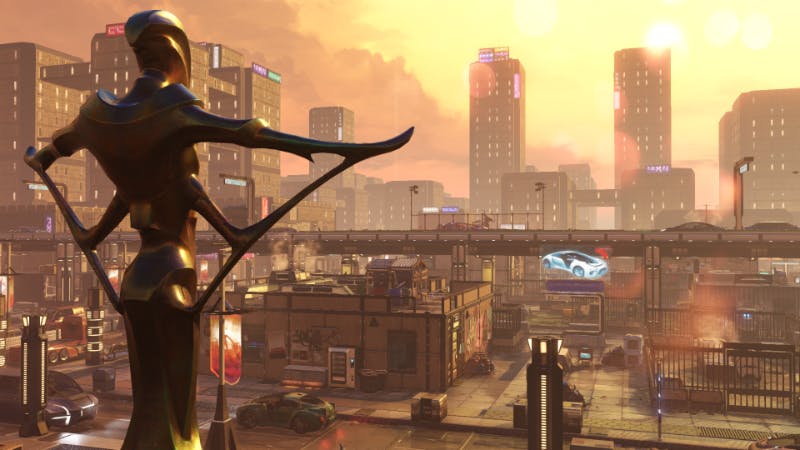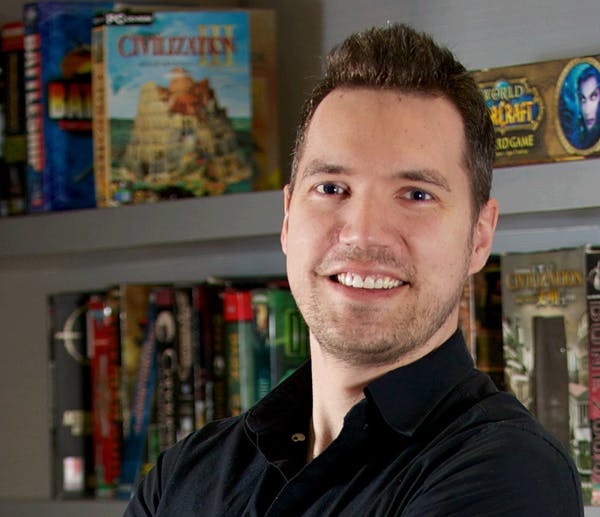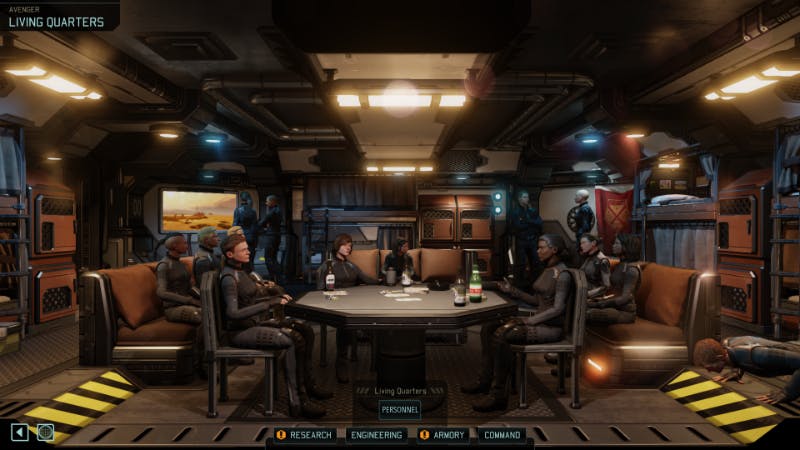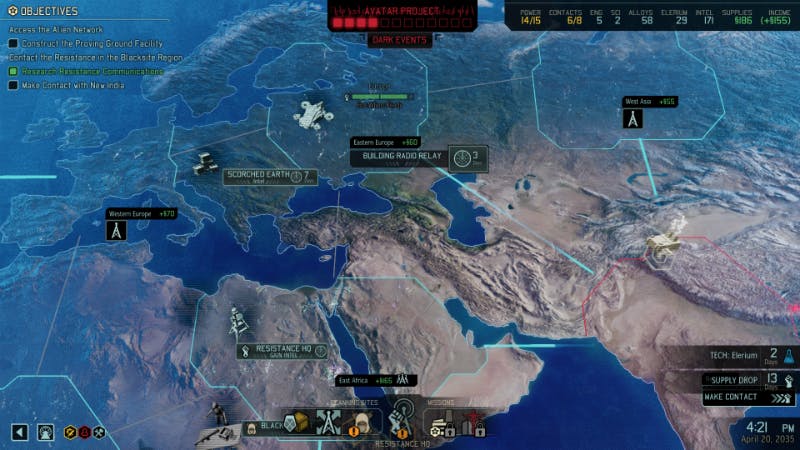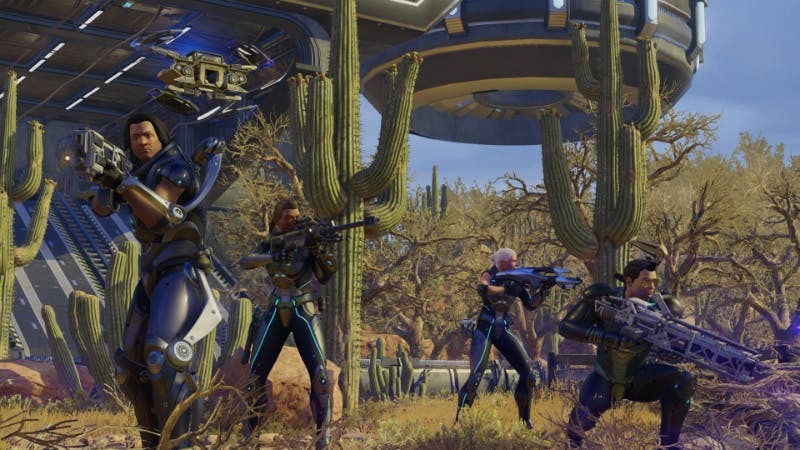Once upon a time, Metallica and Ozzy Osbourne saved the world from an alien invasion. Jake Solomon led the team of game developers that made that happen.
The original UFO: Enemy Unknown, released in 1994 for DOS and Amiga and published in North America as X-COM: UFO Defense, is a legend in the gaming world. It told the story of a multinational force assembled on Earth to repel an alien invasion and combined turn-based infantry battles between X-COM soldiers and alien invaders with a strategic metagame in which the player had to figure out a way to defend the entire planet.
A series of sequels to X-COM: UFO Defense failed to capitalize on the success of the original, and so the X-COM franchise was relegated to cult status until the release of X-COM: Enemy Unknown in 2012. It was a dream project for Solomon, an X-COM devotee who for years had been working as a programmer and designer at Firaxis Games, the studio responsible for the Civilization series.
Firaxis, you may already know was co-founded by famed developer Sid Meier, who was also the co-founder of MicroProse, the developer and publisher of the original X-COM: UFO Defense.
The X-COM reboot was a grueling affair for Solomon and his team with two major false starts in the design process, but when Enemy Unknown was finally released in 2012 it inspired something among the fans that few, least of all the pundits obsessed with whether or not any game could live up to the cult status of the original, probably saw coming.
Like the original, Enemy Unknown was split into two halves, a strategic metagame in which players have to provide protection for an alliance of nations that are funding the XCOM project and a tactical game in which small squads of soldiers have to protect civilians, destroy enemy bases, and ultimately kill the leaders of the invasion.
These soldiers were fragile. Enemy Unknown was not forgiving. And as the game grew more difficult in the latter stages, having a squad of experienced troops was essential to victory. Even if toward the end of the game you had a platoon of healthy, rookie soldiers at XCOM HQ armed with the best weapons and equipment money could buy, the game was still effectively over, because rookies couldn’t win against the battle-hardened, alien invaders.
Enemy Unknown players became fiercely devoted to their veteran soldiers, giving them names and identities, and diving into the game’s customization system. And so it was that Metallica, and then Ozzy Osbourne, were drafted into the ranks of XCOM and perished valiantly at the hands of the invaders. Gamers posted pictures of their troopers on social media, and shared images of the memorial wall at XCOM HQ that commemorated their fallen heroes.
XCOM 2, which will be released for PC on Feb. 5, is understandably highly anticipated. It posits a universe in which the players’ victory in Enemy Unknown never took place. In the universe of XCOM 2, the aliens won. XCOM is now a guerrilla unit that operates from a mobile headquarters called the Avenger. It scours the globe to make contact with resistance cells while striking back at alien bases in an attempt to win back the planet.
We’ve been playing an early build of XCOM 2 for the past several weeks, and I spoke with creative director Jake Solomon about the fans’ devotion to their soldiers in Enemy Unknown and riding the knife edge of creating a sequel that adds to the modern XCOM formula without disrupting what players loved so much about the first game.
Did you get a chance to read the story that I sent to you, about Metallica fighting as part of XCOM?
Yes! I did! I had never seen that, but yeah, that was pretty awesome.
That, to me, is a shining example of the way players formed relationships with their soldiers in Enemy Unknown. Prizing the sniper who always makes the clutch shot or the medic who always survives enemy fire in the rush to heal a squadmate.
This is going to sound cheesy, maybe this should be off the record. Not seriously. I think we are all storytellers. I think something that games are doing and games must do in the future more and more of, is allow players to generate content.
I enjoy playing games when there’s a linear story to it, but it’s surprisingly passive. It doesn’t engage all of me as a person. They create these amazing spectacles, and that’s fine. I love that stuff. It’s like watching a TV show. But at least when I watch a TV show, my favorite way to watch it is like sitting next to my wife, and we’ll talk, we’ll make jokes the whole time. I think that’s an important part of it.
But playing games, I think you have to be able to generate content as a player. Now, if the game doesn’t allow me to generate something unique that I can sort of latch onto for all this time I’m putting in, if I don’t come away with some sense of story, or something I’ve created that I can share, or just something that I feel is my own, like in the world, in the universe, I think it’s a lot harder sell nowadays.
[Soldiers in XCOM], they’re kind of this canvas that gets a name, and the country [they’re from], and maybe they get a nickname. I think it’s really hard to not start projecting onto those canvases. It’s just a natural inclination of players. I think the thing about it is that we could never, ever, possibly create something with as much meaning, and something that’s as appropriate to the player’s experience.
Because I think all stories, all XCOM stories…I think the Metallica one is perfect, because they all have to have a bit of the absurd, and my stories are the same way. They all have a bit of humor to them. Dark humor, because [the soldiers are] fucking killed, but they all have to have a bit of the absurd to them, and that’s not something you can script very well. Players wouldn’t appreciate that.
The game’s role is to play it straight, but then the player, they’re gonna be more absurd when they’re telling their stories and things are happening, and they’ve got these crazy moments. You see yourself not as writing the story for the player, but sort of giving the player a bunch of props. They’re the ones on stage, so you’re just out there making props and throwing them out on stage and seeing what the people can do with them. It’s kind of improv, I guess.
You say you don’t think you could have created the kind of content that the players are creating, but yet when I hear you talking in post-mortems about Enemy Unknown and about turn-based strategy in general, you feel the genre engenders emotional attachment, if not to characters, then to your actions.
Sure!
It creates real ownership of those actions. So were you really surprised by the ferocity at which people were creating their own content?
I did not expect it to be as powerful as it was. You never know as a developer if the experience you’re having with the game is going to match what the players are having. You certainly hope.
It’s really important as a designer to not be academic. That’s at least my personal philosophy. I’m frankly not that smart of a guy anyway, and so I view that as a strength. I am kind of an “every player” in that I don’t get too excited by the details of the mechanics. Even if I’m the one designing the mechanics, I’m not really that academic about it. I’m really focused on the player experience.
But even so, you never know that what your play experience is is what’s going to match the actual players who are new to the experience. So we did put in a bunch of elements, we wanted the player connection to the soldiers to be strong, so we did do things like, “Hey, we’ll put the country flag on their back, we’ll give them a nickname,” but we didn’t go too much further than that.
I look back at Enemy Unknown, now, and I see the options to customize the soldiers were fairly limited. I just didn’t think that was where the player value was, how much value they really are going to get out of customizing soldiers.
And it turns out people found that to be a hugely satisfying aspect of the game, having soldiers that were unique and telling stories. And a lot of the time it’s a famous character or it’s like Knicks players from the ‘90s. They just have these people that they gravitated toward. Or it’s family members.
I think the way you put it, the ferocity of it, really surprised me. Not that it happened, but just the strength of it. If you feel like you’re giving somebody something lasting, that’s generated some emotion in them, that’s where game development gets really rewarding.
In XCOM 2, the soldier customization levels are so deep that it’s approaching respectable levels for RPG character customization.
When you’re designing a sequel, you make a lot of choices. You gotta be careful about what it is you change, but at the same time you gotta offer them a new product and a new experience to bring value to the table.
But that one, in terms of adding customization options, that was like across the board, flat-out, hands down, nobody had any doubts, like that’s obviously going to be a hallmark of XCOM 2, and it was purely a response to our players being able to attach so strongly to what limited options we did give them [in Enemy Unknown].
Is it less stressful working on XCOM 2 than it was working on Enemy Unknown, now that you have this successful template to build off of?
Your audience, you’ve gotten millions of people who have told you in very clear terms what they enjoyed, what they didn’t enjoy, and you know, criticism is something that I think I seek out. And so it doesn’t bother me at all to hear what people didn’t like. You’ve got a huge supercomputer, which is your audience, and they have put in countless hours into the product.
Your job, then, is to say OK, we have this overall structure that’s successful, and then we have feedback from millions of people that are emotionally invested in the product as much as we are. As developers we can look at this and we have to make choices, but these are not things just spraying out of the ground. They have to fit the template that came before.
Criticism really doesn’t bother you? You have such a deep-rooted attachment to the XCOM franchise.
It actually comes out of Sid Meier, my mentor and our company’s founder, he always told me from the very beginning, and I saw him live this, he always said, “Feedback is fact.” And I buy into that 100 percent.
How much do you worry while designing XCOM 2 about altering the balance you created with Enemy Unknown? Every new thing, every change, is a variable in an equation that you’ve created, and in the case of Enemy Unknown, an equation that works.
Quite a bit. Because there’s the fear of we did this thing, and it resonated, but who’s to say that that’s not just a one-off? As a creative person there’s always like, “Well, I got lucky, but I’m still a fraud, so this time we’ll prove once and for all…”
There is a part of you that’s like, “You know what? It would feel good to do something very different right now.” There’s part of you that strays a little too far, because you just want to try out these crazy new ideas you have with no regard for what you’ve already proven that works, and then at the same time there’s a question of “OK, how much should change, how much value is there in change, compared to the value in the parts that people love.”
You would think that once you make a game, once you make XCOM, that you understand how that whole thing was put together, and how I achieved this response, this sort of emotional affect in the player. But the fact of the matter is there are an incredibly high number of parts in a game, especially in strategy games. You have all these systems interacting in interesting ways.
The problem is that you know what the emotional effect is you want in the player, but you can start tweaking knobs and all of a sudden your inputs don’t equal the output you expected. And you’re like, “Holy shit, we just lost some of the magic, here.” You have to be able to find out, by process of elimination, these are the pillars of the game that you really should not fuck with, because once you do, you really run the risk of making something that’s not XCOM.
Games are so complicated. The input of the design systems, ultimately manifesting itself in the player’s emotions, there are so many things in-between you and that, that it’s very easy to knock something askew.
What was an idea you had for XCOM 2 that totally didn’t work? That completely messed with the balance.
There’s probably a few, but one thing that we tried really early on was free flying. You had the Avenger [your mobile base in XCOM 2] and you sort of moved from region to region. You had to actually click-and-drag the Avenger around through the world, and we were like “Yes! It’s more visceral!” or whatever, but actually it was just kind of a pain in the ass.
In XCOM, it’s the choices that are important. And I think that if you start hiding the choices behind mechanics, or actual interaction with the experience, I think that’s where you get into trouble. If the player can’t quickly look at the map and say, “What are my choices here? What am I choosing between?”
I love the flying headquarters, but that was kind of a sort of thing where we started way in left field, and then we pulled back. When we talk about something, I always go like, “Well, what is that going to take away from the game?” From the player experience that we know and love, what is this going to alter? What is this going to change? You have to have an eye on history. You have to have an eye on what XCOM is.
You’re saying at one point that you flew the Avenger around manually to discover things? Now, you click on the area you want to go to, but you’re saying you experimented with the idea of actually, manually flying it around to get to places?
It was more free-form. And what we found was, the players would be like “What am I supposed to do?” The choices weren’t clear.
We were like “Let’s just make it really open-ended. You can fly this thing anywhere.” The problem is, 95 percent of the world is not very interesting, and so why on Earth are we allowing people to…guess what? Ninety-five percent of the time they land somewhere that has no gameplay value at all, and then they look at us like, “What the fuck am I doing?”
We just needed to make this choice-driven, the way that all of our strategy layer decisions are, and then of course it brought it back to something a little more like XCOM.
What I’ve noticed from my time with the game is that my soldiers feel much more vulnerable in the early game than they ever did in Enemy Unknown. The early abilities that my soldiers earn in XCOM 2 aren’t as powerful as the early abilities in the first game. Enemies in the early levels of XCOM 2 are deadlier than aliens in the early levels of Enemy Unknown.
There’s also more pressure on the player this time, as the aliens are pursuing a master plan, and there’s a ticker at the top of the screen that shows you precisely how close the aliens are to completion. Was the intent to make things more difficult for the player in XCOM 2 than in the first game?
Yes. That actually came to me fairly late in the process. Talking about sequels, and how they spring out of the first game, I think the hardest part has been, and what really has shocked me, which we continue to work on, now, is balance.
A lot of our mechanics rely on the assumption that you’re going to be losing soldiers, and that you’re going to have stressful choices. And what happened was that I was actually leaning towards, I kind of want the veteran difficulty, which is the normal difficulty, I kind of wanted that to be pretty easy, you can kind of skate through.
We had it that way, and there was a definite sense of, the gameplay experience wasn’t as good as it could be. Everybody was having fun with it, but they were breezing through, and the problem is that a lot of the system mechanics don’t engage if you’re not under stress.
Recruits cost a lot more than they did in Enemy Unknown. They’re meant to be a resource sink. If the player is doing fine and not spending money on recruits, or not having to go to the Black Market and spend Intel there, a lot of mechanics simply don’t engage and a lot of difficult choices just don’t emerge. A lot of the mechanics are meant to rely on the fact that the player is strapped for resources.
It is a fine line to walk, especially in a sequel. We had a very large audience for the first game. A lot of them are going to come back. Does that mean the sequel has to take into account that a large part of our audience has gone through a big primer on how to play XCOM? Because of that, I think the game is harder. That was intentional.
So here we have a series that provided unexpectedly powerful, emotional relationships between the player and their virtual soldiers, and the second game in the series is putting those soldiers in even more peril. What about the player who takes advantage of the new ability to write a biography for a soldier, and then the soldier dies in the very next mission?
That happened to me during my recent playthrough, and I was reluctant to bother indulging in that level of customization again. Where’s the line drawn between upping the ante to increase the stress and the power of those relationships, and making things so difficult that it’s not worth investing the time into customizing your characters to the fine degree you can in XCOM 2?
You’re not going to form the relationship if you don’t know that something’s at stake. The sense of your soldiers being fragile, in some sense they’re like if you have a pet. That pet is entirely dependent upon you, which creates an incredible defensiveness and fondness for you as an owner, for your pet, because you realize they’re really in your hands and they’re looking to you for protection.
Because the soldiers [in XCOM 2] are virtual, you have to step it up a little bit. The player has to know that the stakes are real, and that the game does not care about whether the player loves this soldier or that soldier. Not that the game dislikes them, but the game is a sport, it lays out the rules, and there are high stakes if you don’t follow the rules.
It is a knife edge. And the game is far more unpredictable, I think. The game can combine in ways tactically that creates some real spikes in difficulty that never happened in Enemy Unknown. This led to the creation of the Character Pool.
Where you can share the templates of your characters with other people online?
More than that is, if you do lavish some attention on one of your soldiers [and move them to the Character Pool], that soldier is now saved as a template forever. And in fact, in future games of XCOM 2, they will re-appear as a recruit.
Let’s say you make Carl Weathers, the ‘80s action hero. You write his bio, you pick out his colors, his customizations, everything, then when you save him to the Character Pool, even if he dies on the next mission, which happens, Carl Weathers is still there. And so Carl Weathers, in future games, will show up as a recruit.
That’s a way we said okay, you can lavish attention on these people, and if they matter to you, you can put them in amber for future games where they can re-appear.
Which kind of fits the theme, because XCOM 2 is this alternate reality where you lost the war in XCOM: Enemy Unknown. So while Carl Weathers dies in one reality, he’s still alive in another reality.
And the fact is, you can actually create characters from the main menu. You don’t need to be in any single-player game. You just go and create them from the main menu, and they will be available in all your future games.
You can then share your pools with friends, or share individual characters with your friends, which is fun, but it also is meant to protect the player, if they do create these great characters. All of us, as developers, we made ourselves as characters in the Character Pool.
So basically, I can go back now to playing XCOM 2, and there’s a chance I could get you killed.
There’s now a chance that I will die a thousand virtual deaths, which is only fair considering how many I’ve caused, myself.
Illustration courtesy of 2K Games

